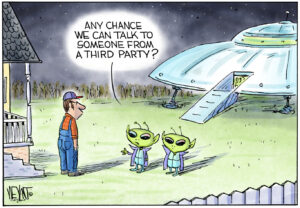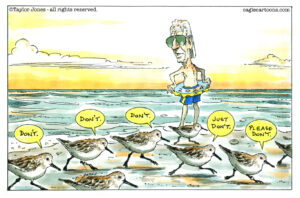The Next Florida
Election Day began with voting machines refusing to start up. It ended with them refusing to shut down.WASHINGTON — Election Day began with voting machines refusing to start up. It ended with them refusing to shut down.
“It was a very stressful day,” says Sandy Martin, director of registration and elections in Horry County, S.C.
She still doesn’t know the precise reasons her county’s computerized, touch-screen machines balked at starting up last Saturday as the polls opened for the state’s Republican primary. Some voters who showed up early complained they were turned away from polling places, and about 6,000 votes wound up being cast on paper — some on printed ballots, others on any piece of paper a poll worker could find. The leading theory for the starting-up problem is that election workers who prepared the equipment failed to run a final procedure meant to set the computers’ vote counters to zero.
More evident, Martin says, is that the machines refused to close down at the end of the day because of a programming error. Because South Carolina’s Democratic primary is not being held until this Saturday, the computers were programmed to shut themselves down on Jan. 26 — not at the end of Republican balloting on Jan. 19. “We had to go into the election menu and tell it to close manually,” Martin told me. Neither glitch affected the vote count, she says.
Still, Horry County has earned itself a minor footnote to presidential electoral history. It is another tale of voting machine failure that causes confusion and anger, marring what should be a gratifying civic exercise in which every eligible voter is allowed to cast a ballot — and is assured that every ballot is properly counted. After the debacle of the 2000 presidential election in Florida, we were supposed to end all this. We haven’t.
As the presidential candidates careen around the country in preparation for primaries in nearly two dozen states on Feb. 5, there is no reason to believe balloting will go smoothly and plenty of reason to anticipate that it won’t. According to an unpublished analysis by Common Cause, 17 states that are still to hold their presidential primaries are at “high risk” of experiencing voting errors due to miscounted or undercounted votes. These states include New Jersey, where despite a new law requiring a voter-verified paper trail for touch-screen machines, election officials opted to delay installing new equipment until June, four months after the state’s Super Tuesday primary. Then there is New York, which still votes on antiquated lever machines.
The New York Times has estimated that in November’s general election, a third of voters will cast ballots for president using touch-screen machines that provide no paper record of the vote that could later be used in a recount.
This touch-and-hope method of voting persists despite chronic difficulties and disputes over the touch-screen machines’ performance. Complaints have mounted that the computers have flipped a choice from one candidate to another, even as the voter watches. The systems often crash or freeze, and require rebooting that can leave a voter wondering if his or her choice was recorded or wiped out.
The most famous mystery involves an apparent 18,000-vote undercount in a hotly contested 2006 Florida congressional contest, an anomaly that has never been fully explained but which the loser contends was due to a computer error that failed to count those votes. Florida is now replacing touch-screen machines but roughly half the state’s voters won’t have them in time for the Jan. 29 primary, according to Common Cause. The switch is expected to be complete before November.
This is what years of partisan bickering, followed more recently by inexplicable congressional dithering, have brought us. Republicans once resisted any acknowledgement that voting systems — not ignorant voters — can and do cause miscounts. To admit error was to cast suspicion on President Bush’s 2000 victory. But hundreds of reported machine malfunctions in everything from school board elections to one-party primaries have now convinced many politicians in both parties that voting systems, notably the touch-screen systems, can and do fail.
One by one, governors, state legislatures and elections officials are converting these systems to those in which some sort of paper record is produced. Congress could speed the changeover dramatically by approving pending legislation to help states finance the transition.
Florida can now be confident that it will not be the next Florida. But unless Congress and the states act together — urgently — some state, somewhere, is bound to be.
Marie Cocco’s e-mail address is mariecocco(at)washpost.com.
© 2008, Washington Post Writers Group
Your support matters…Independent journalism is under threat and overshadowed by heavily funded mainstream media.
You can help level the playing field. Become a member.
Your tax-deductible contribution keeps us digging beneath the headlines to give you thought-provoking, investigative reporting and analysis that unearths what's really happening- without compromise.
Give today to support our courageous, independent journalists.









You need to be a supporter to comment.
There are currently no responses to this article.
Be the first to respond.